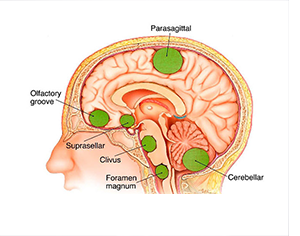
A brain tumor is a mass or growth of abnormal cells in the brain. Many different types of brain tumors exist which are generally noncancerous or benign and some brain tumors are cancerous which are generally malignant. Brain tumors can begin in the brain as primary brain tumors, or cancer can begin in other parts of the body and spread to the brain as secondary, or metastatic, brain tumors.
How quickly a brain tumor grows can vary greatly also the location of a brain tumor determines how it will affect the function of the nervous system.
Types Of Brain Tumor
Acoustic Neuroma: Acoustic neuroma, also known as vestibular schwannoma, is a noncancerous and usually slow-growing tumor that develops on the main or vestibular nerve leading from the inner ear to the brain. Branches of this nerve directly influence the balance as well as the hearing ability, and pressure from an acoustic neuroma can cause hearing loss, ringing in the ear and unsteadiness. Treatments for acoustic neuroma often include regular monitoring, radiation, and surgical removal.
Astrocytoma: Astrocytoma is a type of cancer that can form in the brain or spinal cord. This type of cancer begins in cells called astrocytes that support nerve cells. The symptoms of Astrocytoma depend on the location of the tumor. Astrocytoma that occurs in the brain can cause seizures, headaches, and nausea, while those in the spinal cord can cause weakness and disability in the area affected by the growing tumor.
Brain Metastases: Brain metastases occur when cancer cells spread from their original site to the brain. The most likely areas where brain metastases can be caused are lung, breast, colon, kidney, and melanoma. As the metastatic brain tumors grow, they create pressure and often change the functioning of the surrounding brain tissue. Treatment for people whose cancer has spread to the brain is often surgery, radiation therapy, chemotherapy or immunotherapy based on the severity of the condition. Treatment is often focused on reducing pain and symptoms resulting from cancer.
Choroid Plexus Carcinoma: A choroid plexus carcinoma is a rare cancerous or malignant brain tumor that occurs mainly in children that begins near the brain tissue that secretes the cerebrospinal fluid. A noncancerous tumor of this area is called a Choroid Plexus Papilloma. As the tumor grows, it can affect the function of nearby areas in the brain, causing excess fluid in the brain, a condition referred to as hydrocephalus, irritability, nausea, and headaches
Craniopharyngioma: Craniopharyngioma is a rare type of noncancerous or benign brain tumor that begins near the brain's pituitary gland, which secretes hormones that control multiple body functions. As a craniopharyngioma slowly grows, it can affect the function of the pituitary gland and other nearby structures in the brain. Although it mostly occurs in children it is not age-dependent. Symptoms usually include gradual changes in vision, fatigue, excessive urination and headaches. In children, growth may be slow and often smaller than expected.
Embryonal Tumors: Embryonal tumors of the central nervous system are cancerous or malignant tumors that start in the fetal embryonic cells in the brain. It can occur at any age, but most often occur in babies and young children. These tumors are further divided into the following classifications:
Ependymoma: Ependymoma is a type of tumor that can form in the brain or spinal cord. It begins in the ependymal cells in the brain and spinal cord that line the passageways where the cerebrospinal fluid that nourishes the brain flows.
Glioblastoma: Glioblastoma is an aggressive type of cancer that can occur in the brain or spinal cord. These form from cells called astrocytes that support nerve cells. Glioblastoma, also known as glioblastoma multiforme, can be very difficult to treat, however, treatments may have slow progression of cancer and reduce signs and symptoms.
Glioma: Glioma is a type of tumor that occurs in the brain and spinal cord that usually begin in the gluey supportive cells called glial cells that surround nerve cells and help them function. Glioma is classified according to the type of glial cell involved in the tumor, as well as the tumor's genetic features, which can help predict how the tumor will behave over time and the treatments most likely to work.
Medulloblastoma: Medulloblastoma is a cancerous and malignant brain tumor that starts in the lower back part of the brain, called the cerebellum which is involved in muscle coordination, balance and movement. Medulloblastoma tends to spread through cerebrospinal fluid (CSF) that surrounds and protects the brain and spinal cord — to other areas around the brain and spinal cord.
Meningioma: A Meningioma is a tumor that arises from the meninges which are the membranes that surround the brain and spinal cord. Much different than a tumor, it is included in this category because it may compress or squeeze the adjacent brain, nerves, and vessels. Meningioma is the most common type of tumor that forms in the head.
Oligodendroglioma: Oligodendroglioma is a tumor that can occur in the brain or spinal cord and generally forms from oligodendrocytes that are cells in the brain and spinal cord which produces a substance for protecting nerve cells.
Pediatric Brain Tumors: Pediatric brain tumors are masses or growths of abnormal cells that occur in a child's brain or the tissue and structures that surround it. Many different types of pediatric brain tumors exist out of which some are noncancerous or benign and some are cancerous or malignant. Treatment and chance of recovery usually depend upon the type of tumor, its location within the brain, the extent of spread and the child's age and general health.
Pineoblastoma: Pineoblastoma is a rare and aggressive type of cancer that begins in the cells of the brain's pineal gland which is located in the center of the brain and produces a hormone referred to as as ‘melatonin’ that plays a role in the natural sleep-wake cycle.
Pituitary Tumors: Pituitary tumors are abnormal growth that develops in the pituitary gland. Some tumors result in the secretion of more hormones that regulate important functions of your body while some can cause your pituitary gland to produce lower levels of hormones. Most pituitary tumors are noncancerous or benign growths referred to as ‘adenomas’. Adenomas remain in the pituitary gland or surrounding tissues and don't spread to other parts of your body.
What are the symptoms of a brain tumor?
Brain tumor symptoms depend on the size and location of the tumor.
What is the most common type of brain tumor?
Glioma is the most common type of primary brain tumor in adults and children.
What causes brain tumors?
While the direct cause of brain tumors is still unknown, experts suggest that the majority of brain tumors stem from genes that cause uncontrolled cell growth.
What is the treatment for brain tumors?
Many people get a combination of one or more of these treatment options - Surgery; Radiation therapy and Chemotherapy
Types Of Brain Tumor
Acoustic Neuroma: Acoustic neuroma, also known as vestibular schwannoma, is a noncancerous and usually slow-growing tumor that develops on the main or vestibular nerve leading from the inner ear to the brain. Branches of this nerve directly influence the balance as well as the hearing ability, and pressure from an acoustic neuroma can cause hearing loss, ringing in the ear and unsteadiness. Treatments for acoustic neuroma often include regular monitoring, radiation, and surgical removal.
Astrocytoma: Astrocytoma is a type of cancer that can form in the brain or spinal cord. This type of cancer begins in cells called astrocytes that support nerve cells. The symptoms of Astrocytoma depend on the location of the tumor. Astrocytoma that occurs in the brain can cause seizures, headaches, and nausea, while those in the spinal cord can cause weakness and disability in the area affected by the growing tumor.
Brain Metastases: Brain metastases occur when cancer cells spread from their original site to the brain. The most likely areas where brain metastases can be caused are lung, breast, colon, kidney, and melanoma. As the metastatic brain tumors grow, they create pressure and often change the functioning of the surrounding brain tissue. Treatment for people whose cancer has spread to the brain is often surgery, radiation therapy, chemotherapy or immunotherapy based on the severity of the condition. Treatment is often focused on reducing pain and symptoms resulting from cancer.
Choroid Plexus Carcinoma: A choroid plexus carcinoma is a rare cancerous or malignant brain tumor that occurs mainly in children that begins near the brain tissue that secretes the cerebrospinal fluid. A noncancerous tumor of this area is called a Choroid Plexus Papilloma. As the tumor grows, it can affect the function of nearby areas in the brain, causing excess fluid in the brain, a condition referred to as hydrocephalus, irritability, nausea, and headaches
Craniopharyngioma: Craniopharyngioma is a rare type of noncancerous or benign brain tumor that begins near the brain's pituitary gland, which secretes hormones that control multiple body functions. As a craniopharyngioma slowly grows, it can affect the function of the pituitary gland and other nearby structures in the brain. Although it mostly occurs in children it is not age-dependent. Symptoms usually include gradual changes in vision, fatigue, excessive urination and headaches. In children, growth may be slow and often smaller than expected.
Embryonal Tumors: Embryonal tumors of the central nervous system are cancerous or malignant tumors that start in the fetal embryonic cells in the brain. It can occur at any age, but most often occur in babies and young children. These tumors are further divided into the following classifications:
Ependymoma: Ependymoma is a type of tumor that can form in the brain or spinal cord. It begins in the ependymal cells in the brain and spinal cord that line the passageways where the cerebrospinal fluid that nourishes the brain flows.
Glioblastoma: Glioblastoma is an aggressive type of cancer that can occur in the brain or spinal cord. These form from cells called astrocytes that support nerve cells. Glioblastoma, also known as glioblastoma multiforme, can be very difficult to treat, however, treatments may have slow progression of cancer and reduce signs and symptoms.
Glioma: Glioma is a type of tumor that occurs in the brain and spinal cord that usually begin in the gluey supportive cells called glial cells that surround nerve cells and help them function. Glioma is classified according to the type of glial cell involved in the tumor, as well as the tumor's genetic features, which can help predict how the tumor will behave over time and the treatments most likely to work.
Medulloblastoma: Medulloblastoma is a cancerous and malignant brain tumor that starts in the lower back part of the brain, called the cerebellum which is involved in muscle coordination, balance and movement. Medulloblastoma tends to spread through cerebrospinal fluid (CSF) that surrounds and protects the brain and spinal cord — to other areas around the brain and spinal cord.
Meningioma: A Meningioma is a tumor that arises from the meninges which are the membranes that surround the brain and spinal cord. Much different than a tumor, it is included in this category because it may compress or squeeze the adjacent brain, nerves, and vessels. Meningioma is the most common type of tumor that forms in the head.
Oligodendroglioma: Oligodendroglioma is a tumor that can occur in the brain or spinal cord and generally forms from oligodendrocytes that are cells in the brain and spinal cord which produces a substance for protecting nerve cells.
Pediatric Brain Tumors: Pediatric brain tumors are masses or growths of abnormal cells that occur in a child's brain or the tissue and structures that surround it. Many different types of pediatric brain tumors exist out of which some are noncancerous or benign and some are cancerous or malignant. Treatment and chance of recovery usually depend upon the type of tumor, its location within the brain, the extent of spread and the child's age and general health.
Pineoblastoma: Pineoblastoma is a rare and aggressive type of cancer that begins in the cells of the brain's pineal gland which is located in the center of the brain and produces a hormone referred to as as ‘melatonin’ that plays a role in the natural sleep-wake cycle.
Pituitary Tumors: Pituitary tumors are abnormal growth that develops in the pituitary gland. Some tumors result in the secretion of more hormones that regulate important functions of your body while some can cause your pituitary gland to produce lower levels of hormones. Most pituitary tumors are noncancerous or benign growths referred to as ‘adenomas’. Adenomas remain in the pituitary gland or surrounding tissues and don't spread to other parts of your body.
What are the symptoms of a brain tumor?
Brain tumor symptoms depend on the size and location of the tumor.
What is the most common type of brain tumor?
Glioma is the most common type of primary brain tumor in adults and children.
What causes brain tumors?
While the direct cause of brain tumors is still unknown, experts suggest that the majority of brain tumors stem from genes that cause uncontrolled cell growth.
What is the treatment for brain tumors?
Many people get a combination of one or more of these treatment options - Surgery; Radiation therapy and Chemotherapy

Rating :

With a capacity of 21 beds, this state-of-the-art specialty hospital is committed to bringing together world-class medical services and healthcare management practices. Apollo Spectra hospital offers expert care in a wide range of su.....

Rating :

ISIC is the most advanced Spine, Orthopedic and Neuromuscular Surgical centre in India with the latest state of the art diagnostics and surgical equipment and a highly qualified team of specialists recognized internationally who have been trained in leading institu.....

Rating :

Rating :

Rating :
The Dental Arch is a full-service dental clinic in Mumbai, India that prides itself on superior quality and Western standards of excellence for dentistry. Founded by award winning dentists Dr. Gaurav Poplai and Dr. Kanika Madan, the clinic has a comfortable new and.....

Rating :

Eternal Hospital (A unit of Eternal Heart Care Centre and Research Institute) is a state-of-the-art tertiary care hospital in Jaipur city. This landmark Healthcare Institute is the result of the vision of Dr. Samin K. Sharma, world r.....

Rating :
Lotus Eye Hospital in Juhu, Mumbai, is the one of the most trusted charitable organization and has become the pioneer of affordable eye care. due to which in recent times numerous organisations have adopted similar names, but the old.....

Rating :

Rating :

FMS Dental Hospitals……the beginning of a new era in speciality dental practice. FMS was.....

Rating :







A brain tumor is a mass or growth of abnormal cells in the brain. Many different types of brain tumors exist which are generally noncancerous or benign and some brain tumors are cancerous which are generally malignant. Brain tumors can begin in the brain as primary brain tumors, or cancer can begin in other parts of the body and spread to the brain as secondary, or metastatic, brain tumors.
How quickly a brain tumor grows can vary greatly also the location of a brain tumor determines how it will affect the function of the nervous system.
Types Of Brain Tumor
Acoustic Neuroma: Acoustic neuroma, also known as vestibular schwannoma, is a noncancerous and usually slow-growing tumor that develops on the main or vestibular nerve leading from the inner ear to the brain. Branches of this nerve directly influence the balance as well as the hearing ability, and pressure from an acoustic neuroma can cause hearing loss, ringing in the ear and unsteadiness. Treatments for acoustic neuroma often include regular monitoring, radiation, and surgical removal.
Astrocytoma: Astrocytoma is a type of cancer that can form in the brain or spinal cord. This type of cancer begins in cells called astrocytes that support nerve cells. The symptoms of Astrocytoma depend on the location of the tumor. Astrocytoma that occurs in the brain can cause seizures, headaches, and nausea, while those in the spinal cord can cause weakness and disability in the area affected by the growing tumor.
Brain Metastases: Brain metastases occur when cancer cells spread from their original site to the brain. The most likely areas where brain metastases can be caused are lung, breast, colon, kidney, and melanoma. As the metastatic brain tumors grow, they create pressure and often change the functioning of the surrounding brain tissue. Treatment for people whose cancer has spread to the brain is often surgery, radiation therapy, chemotherapy or immunotherapy based on the severity of the condition. Treatment is often focused on reducing pain and symptoms resulting from cancer.
Choroid Plexus Carcinoma: A choroid plexus carcinoma is a rare cancerous or malignant brain tumor that occurs mainly in children that begins near the brain tissue that secretes the cerebrospinal fluid. A noncancerous tumor of this area is called a Choroid Plexus Papilloma. As the tumor grows, it can affect the function of nearby areas in the brain, causing excess fluid in the brain, a condition referred to as hydrocephalus, irritability, nausea, and headaches
Craniopharyngioma: Craniopharyngioma is a rare type of noncancerous or benign brain tumor that begins near the brain's pituitary gland, which secretes hormones that control multiple body functions. As a craniopharyngioma slowly grows, it can affect the function of the pituitary gland and other nearby structures in the brain. Although it mostly occurs in children it is not age-dependent. Symptoms usually include gradual changes in vision, fatigue, excessive urination and headaches. In children, growth may be slow and often smaller than expected.
Embryonal Tumors: Embryonal tumors of the central nervous system are cancerous or malignant tumors that start in the fetal embryonic cells in the brain. It can occur at any age, but most often occur in babies and young children. These tumors are further divided into the following classifications:
Ependymoma: Ependymoma is a type of tumor that can form in the brain or spinal cord. It begins in the ependymal cells in the brain and spinal cord that line the passageways where the cerebrospinal fluid that nourishes the brain flows.
Glioblastoma: Glioblastoma is an aggressive type of cancer that can occur in the brain or spinal cord. These form from cells called astrocytes that support nerve cells. Glioblastoma, also known as glioblastoma multiforme, can be very difficult to treat, however, treatments may have slow progression of cancer and reduce signs and symptoms.
Glioma: Glioma is a type of tumor that occurs in the brain and spinal cord that usually begin in the gluey supportive cells called glial cells that surround nerve cells and help them function. Glioma is classified according to the type of glial cell involved in the tumor, as well as the tumor's genetic features, which can help predict how the tumor will behave over time and the treatments most likely to work.
Medulloblastoma: Medulloblastoma is a cancerous and malignant brain tumor that starts in the lower back part of the brain, called the cerebellum which is involved in muscle coordination, balance and movement. Medulloblastoma tends to spread through cerebrospinal fluid (CSF) that surrounds and protects the brain and spinal cord — to other areas around the brain and spinal cord.
Meningioma: A Meningioma is a tumor that arises from the meninges which are the membranes that surround the brain and spinal cord. Much different than a tumor, it is included in this category because it may compress or squeeze the adjacent brain, nerves, and vessels. Meningioma is the most common type of tumor that forms in the head.
Oligodendroglioma: Oligodendroglioma is a tumor that can occur in the brain or spinal cord and generally forms from oligodendrocytes that are cells in the brain and spinal cord which produces a substance for protecting nerve cells.
Pediatric Brain Tumors: Pediatric brain tumors are masses or growths of abnormal cells that occur in a child's brain or the tissue and structures that surround it. Many different types of pediatric brain tumors exist out of which some are noncancerous or benign and some are cancerous or malignant. Treatment and chance of recovery usually depend upon the type of tumor, its location within the brain, the extent of spread and the child's age and general health.
Pineoblastoma: Pineoblastoma is a rare and aggressive type of cancer that begins in the cells of the brain's pineal gland which is located in the center of the brain and produces a hormone referred to as as ‘melatonin’ that plays a role in the natural sleep-wake cycle.
Pituitary Tumors: Pituitary tumors are abnormal growth that develops in the pituitary gland. Some tumors result in the secretion of more hormones that regulate important functions of your body while some can cause your pituitary gland to produce lower levels of hormones. Most pituitary tumors are noncancerous or benign growths referred to as ‘adenomas’. Adenomas remain in the pituitary gland or surrounding tissues and don't spread to other parts of your body.
What are the symptoms of a brain tumor?
Brain tumor symptoms depend on the size and location of the tumor.
What is the most common type of brain tumor?
Glioma is the most common type of primary brain tumor in adults and children.
What causes brain tumors?
While the direct cause of brain tumors is still unknown, experts suggest that the majority of brain tumors stem from genes that cause uncontrolled cell growth.
What is the treatment for brain tumors?
Many people get a combination of one or more of these treatment options - Surgery; Radiation therapy and Chemotherapy

Rating :

With a capacity of 21 beds, this state-of-the-art specialty hospital is committed to bringing together world-class medical services and healthcare management practices. Apollo Spectra hospital offers expert care in a wide range of su.....

Rating :

ISIC is the most advanced Spine, Orthopedic and Neuromuscular Surgical centre in India with the latest state of the art diagnostics and surgical equipment and a highly qualified team of specialists recognized internationally who have been trained in leading institu.....

Rating :

Rating :

Rating :
The Dental Arch is a full-service dental clinic in Mumbai, India that prides itself on superior quality and Western standards of excellence for dentistry. Founded by award winning dentists Dr. Gaurav Poplai and Dr. Kanika Madan, the clinic has a comfortable new and.....

Rating :

Eternal Hospital (A unit of Eternal Heart Care Centre and Research Institute) is a state-of-the-art tertiary care hospital in Jaipur city. This landmark Healthcare Institute is the result of the vision of Dr. Samin K. Sharma, world r.....

Rating :
Lotus Eye Hospital in Juhu, Mumbai, is the one of the most trusted charitable organization and has become the pioneer of affordable eye care. due to which in recent times numerous organisations have adopted similar names, but the old.....

Rating :

Rating :

FMS Dental Hospitals……the beginning of a new era in speciality dental practice. FMS was.....

Rating :






Not Available
Medtravels ensures bridging the gap and providing accessibility for patients to interact directly with healthcare service providers. We remain committed to connecting all stakeholders across geographies, and focusing on taking Healthcare beyond boundaries.

We are one of the first few organizations in India to be NABH certified. This itself speaks out loud about the services and facilities we provide to our clients while ensuring optimum quality at all aspects.

We ensure to bring you the best in terms of both healthcare quality & affordability. We value our customers so providing the best of services to them at an affordable price is our objective.

We understand that getting the first opinion is the most crucial step towards your healthcare journey and so based on your reports, we provide you consultation(s) or opinion(s) from top-notch doctors & consultants without any charges.

Travelling outside your home country can be a rigorous affair. So, here we are, to guide you through all the necessities such as – Medical Visa, Air Bookings, Accommodation, Air Ambulance, Pharmacy, Medical Loan, Leisure Travel.

We constantly strive to provide our clients with maximum options and so we have global coverage in terms of Healthcare Providers. We provide you hospital options from – INDIA, SINGAPORE, THAILAND, MALAYSIA, TURKEY & the list goes on

Our objective is to work with complete transparency with both our partners & clients. With this motto, we maintain not to charge you for anything. When you come for treatment, you pay the hospital directly.
Not Available